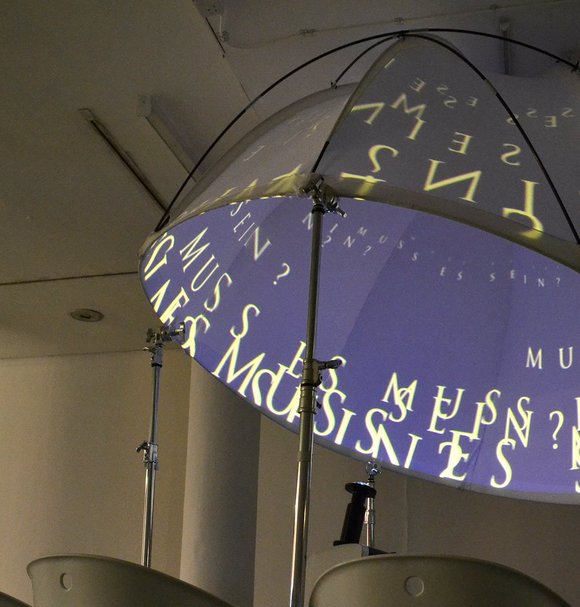
Key details
Date
- 21 November 2023
Read time
- 3 minutes
Dr Charlotte Lengersdorf uses the paradoxical qualities of asemic writing to challenge cause and effect relationships within human-computer interactions.
Key details
Date
- 21 November 2023
Read time
- 3 minutes
Dr Charlotte Lengersdorf (Communication PhD, 2023) is a visual communicator, researcher and lecturer born in Germany and based in London. Her research emerges from the intersection between type design, human-computer interaction and programming with specific interest in the nonsensical, undetermined and unknown.
Her PhD research at the RCA, which led on from her MA here, involved programming visually abstract real-time human-computer interfaces to explore asemic writing, a form of writing which does not use any words. Through this she explored, tested and expanded on her concept of un-causality – a dissonance between a cause and the anticipated effect. The iterative nature of programming was a way to create, and encounter, a continuous mutation of the relationship between action and reaction.
Here, Charlotte shares her experiences of doctoral research at the RCA.

What is your background and what led you to PhD study?
The spark for my PhD research germinated during my MA in Visual Communication (Graphic Design) at the RCA, which I completed in 2018. I was exploring the concept of asemic writing in my practice as a visual communicator and type designer. At the time, there was little existing literature on the subject. My tutors and professors at the RCA encouraged me to explore this area in more depth as part of a PhD.
My primary motivation was to see where a more extensive engagement with the concept of asemic writing might take my creative and intellectual journey. I was fortunate enough to secure funding from The German Academic Scholarship Foundation, which further supported my decision to embark on this research.
“The RCA was an institution I knew would provide the ideal environment for the kind of open-minded, transdisciplinary and experimental approach to research I was looking for.”
Communication PhD alumna
Why did you decide to carry out this research at the RCA?
I submitted my PhD application while I was still in the process of completing my MA at the RCA. The decision to continue my academic journey within the same university seemed like a natural progression. The RCA was an institution I knew would provide the ideal environment for the kind of open-minded, transdisciplinary and experimental approach to research I was looking for.

What was the greatest benefit to studying at the RCA?
Studying at the RCA has given me the opportunity to work with experienced supervisors and the reassurance of a carefully curated programme that continually reviews and evaluates the research journey. The weekly research seminar with fellow students and international guest lecturers served as a forum for the exchange of ideas and insights. Living in a city like London provided an inspiring backdrop for my research and allowed me to network with peers from different academic disciplines and schools.
“Living in a city like London provided an inspiring backdrop for my research and allowed me to network with peers from different academic disciplines and schools.”
Communication PhD alumna
What are the implications or applications for your research findings?
The asemic, the nonsensical or the dissonant may be hastily explained away or dismissed from the outset as a subject not worth pursuing, especially from the perspective of a visual communicator.
In the context of my research, engaging with the nonsensical became less about making sense of nonsense and more about creating spaces for discovery rather than explanation. I argue for a way of thinking, acting, and designing that does not simply affirm or imitate already known human possibilities, but pushes the body towards new encounters in an interaction with the world and with technology.
My concept of uncausality becomes both a method and a methodology for uncovering potentialities for action and thought beyond conditioned patterns of causality and experience. This seems crucial at a time when humans are being asked to reevaluate their habitual ways of being.

How has carrying out this research impacted on your career?
My PhD has been an opportunity to understand my practice as dynamic, open and constantly evolving, rather than being defined or confined by the traditional ideals of a discipline. I have come to recognise the transformative and transdisciplinary nature of my work.
In addition, this doctoral journey has given me the opportunity to teach and share my findings through invitations to speak at universities, enriching my own understanding and contributing to the academic discourse. This experience has had a profound impact on my career aspirations. Instead of pursuing a career in graphic design alone, I now see myself gravitating towards research, writing, and teaching, seeking transdisciplinary exchange.
“This experience has had a profound impact on my career aspirations.”
Communication PhD alumna
Why is practice based research important and what can it contribute to knowledge?
It is becoming increasingly clear that the complex challenges of contemporary society can no longer be addressed by a single discipline or mode of research. Practice-based research can cultivate ways of knowing that are not reflective, anticipatory, and static, but speculative, creative and dynamic, where practice and theory are intertwined to foster an emergence of the new.

Charlotte was awarded her PhD at the RCA convocation ceremony in autumn 2023 along with 11 other PhD and MPhil students. These graduates represent a small part of the 250 strong doctoral research community at the College. They contribute to exhibitions, events, symposia and conferences at the College and beyond. Their investigations are supported by supervisory teams who have experience from diverse practice backgrounds and academic fields.


